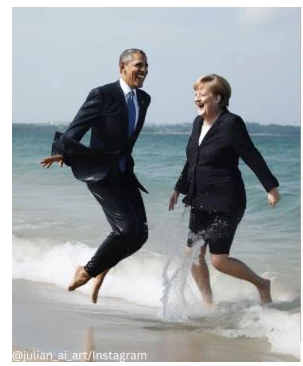In the span of just one week, the world witnessed the whimsical side of technology as well as its darker implications through a series of viral deepfake images. The first set featured a seemingly heartwarming stroll at the beach between two former heads of states, Barack Obama and Angela Merkel, delighting onlookers with their camaraderie. However, the truth behind these images unraveled as they were revealed to be the creative work of a visual artist named Julian. His Instagram account, once robust with such imaginative content, has since vanished. #AliaBhat
The following week, the mood took a sharp turn as images depicting the arrest of former President Trump circulated, evoking violence, edginess, and rage. Once again, these images turned out to be deepfakes, highlighting the alarming potential for realistic digital manipulations that leverage machine learning to craft convincing yet entirely fabricated content.
While both artists responsibly declared their creations as fake, the impact of these images when divorced from their context could easily mislead unsuspecting viewers. In a world where sensationalism often overshadows scrutiny, these manufactured images have the power to push individuals over the edge, fueling outrage and perpetuating misinformation.
Conspiracy theorists, ever eager to exploit any semblance of ambiguity, are likely to leverage both sets of images to further their agendas. The Merkel-Obama pictures may be used to spin tales of a calculated conspiracy between leaders, shaping the West’s trajectory in a particular direction. On the flip side, the Trump images could be weaponized to portray the state as an oppressor, potentially inciting calls to arms against it.
Examining the Trump images closely reveals their falseness. In a rapidly evolving scenario, capturing every element in complete focus, from Trump to the police to the batons, is highly improbable. However, for the average viewer who encounters these images without the accompanying disclaimers, perhaps through a WhatsApp or email feed, the distinction between reality and manipulation blurs.


